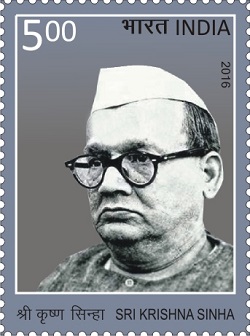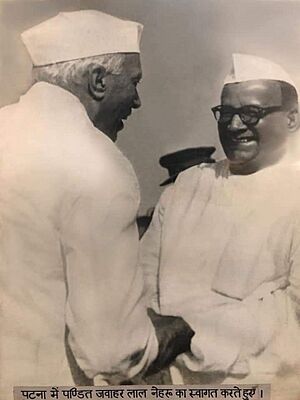Shri Krishna Sinha facts for kids
Quick facts for kids
Shri Krishna Singh
|
|
|---|---|
|
Shri Babu
|
|
 |
|
| 1st Chief Minister of Bihar | |
| In office 15 August 1947 – 31 January 1961 |
|
| Preceded by | Office Established |
| Succeeded by | Deep Narayan Singh |
| 2nd Finance Minister of Bihar | |
| In office 5 July 1957 – 31 January 1961 |
|
| Preceded by | Anugrah Narayan Sinha |
| Succeeded by | Deep Narayan Singh |
| 2nd Premier of Bihar Province | |
| In office 20 July 1937 – 31 October 1939 |
|
| Preceded by | Mohammad Yunus |
| Succeeded by | Governor's rule |
| In office 2 April 1946 - 15 August 1947 |
|
| Member Of the Constituent Assembly | |
| In office 9 December 1946 – 26 January 1950 |
|
| Preceded by | Post Created |
| Succeeded by | Post Abolished |
| Member of the Bihar Legislative Assembly | |
| In office 1952–1961 |
|
| Preceded by | Position Established |
| Succeeded by | Shiv Shankar Singh |
| Personal details | |
| Born | 21 October 1887 Sheikhpura, Bengal Presidency, British India |
| Died | 31 January 1961 (aged 74) Patna, Bihar, India |
| Political party | Indian National Congress |
| Children | 2 |
| Alma mater | University of Calcutta, Patna University |
| Occupation | Lawyer Nationalist Statesman Educationist Administrator |
| Nicknames | Bihar Kesari, Shri Babu |
Shri Krishna Singh (born October 21, 1887 – died January 31, 1961), also known as Shri Babu, was a very important leader in India. He became the first Chief Minister of Bihar state and served from 1946 until his death in 1961. He was a key figure in building modern Bihar, working alongside other great leaders like Rajendra Prasad and Anugrah Narayan Sinha.
Shri Krishna Singh was known for his powerful speeches, which earned him the nickname Bihar Kesari, meaning "Lion of Bihar". He was also the first Chief Minister in India to end the zamindari system, which was a land ownership system that often made farmers poor. He spent about eight years in jail fighting for India's freedom from British rule.
He was a very knowledgeable person and loved books. In 1959, he gave his personal collection of 17,000 books to a public library in Munger. This library is now named after him.
Contents
Early Life and Education
Shri Krishna Singh was born on October 21, 1887, in a village called Maur in Munger district (now part of Sheikhpura district). When he was five years old, his mother passed away.
He went to school in his village and later at Zila School in Munger. In 1906, he joined Patna College. He earned a master's degree from the University of Calcutta and later a law degree from Patna University. After his studies, he started working as a lawyer in Munger in 1915. He had two sons, Shivshankar and Bandishankar.
Fighting for India's Freedom
Shri Krishna Singh met Mahatma Gandhi for the first time in 1916. He was deeply inspired by Gandhi's ideas. In 1921, he stopped practicing law to join Gandhi's Non-cooperation Movement. This movement encouraged Indians to peacefully refuse to cooperate with the British government.
He was arrested for the first time in 1922 for his activism. Because of his brave actions, people started calling him Bihar Kesari. After being released in 1923, he became a member of the All India Congress Committee, a major political group fighting for independence.
In 1930, he took part in the Salt Satyagraha, a protest against the British salt tax. He was injured during his arrest and spent time in jail. He was arrested multiple times during the civil disobedience movement and spent several years in prison.
After being released, he continued his work for India's freedom. He also helped people after the big 1934 Nepal–Bihar earthquake. He was elected to the Bihar Legislature Assembly multiple times and became a strong leader of the Congress party in Bihar.
Becoming Premier of Bihar
On July 20, 1937, Shri Krishna Singh became the Premier (like a Chief Minister) of Bihar province. He formed his government in Patna. He and his colleague A.N. Sinha resigned because they disagreed with the British governor about releasing political prisoners. The governor eventually agreed to their demands, and they returned to office.
However, they resigned again in 1939. This was because the British government involved India in World War II without asking the Indian people. Like other Congress leaders, Shri Krishna Singh believed this was wrong.
During the Quit India movement in 1942, he was arrested again. He was released in 1944 due to serious illness. After India gained independence, he became a member of the Constituent Assembly of India, which wrote the Constitution of India.
Contributions to Modern Bihar
Shri Krishna Singh served as the Chief Minister of Bihar from 1946 until his death in 1961. During his time, he worked hard to develop the state.

He started many important projects, especially in agriculture and industry. Bihar became a leading state in India's first five-year plan, focusing on rural development. Later, he brought several large industries to Bihar, including:
- The Barauni Refinery (an oil refinery)
- The Heavy Engineering Corporation in Ranchi
- The Bokaro Steel Plant
- The Barauni Fertiliser Plant
- The Barauni Thermal Power Station (a power plant)
He also wanted to create an industrial area along the Ganges river. To do this, he oversaw the building of the Rajendra Setu in 1959. This was the first railroad bridge built over the Ganges river in independent India.
Shri Krishna Singh also made a huge difference in education and social development. He helped establish many institutions, such as:
- The Anugraha Narayan Sinha Institute of Social Studies in Patna
- The Netarhat school in Ranchi
- Engineering colleges in various cities like Muzaffarpur, Bhagalpur, and Jamshedpur
- A Sanskrit College in Patna
- An orphanage in Muzaffarpur
His leadership was so effective that an American expert, Paul H. Appleby, described Bihar as "the best governed state in India" during his time.
Values and Legacy
Shri Krishna Singh was known for his strong values. He believed in Humanism, Integrity, and Secularism. He was a strong opponent of the caste system and always stood up for people who were treated unfairly.
He worked closely with government officials and ensured that the police force served the people fairly. He believed that in a democratic India, police should be helpful and efficient.
He also introduced important land reforms in Bihar, which helped farmers. Justice V. R. Krishna Iyer, a respected judge, said that Shri Krishna Singh "lived poor, died poor and identified himself with the poor."
Today, Shri Krishna Singh is remembered as a visionary leader who laid the foundation for modern Bihar. Many places are named after him, including the Srikrishna Science Centre and the Shri Krishna Memorial Hall in Patna.
Remembering Shri Babu
Both the Indian National Congress and the Bharatiya Janata Party, two major political parties in India, celebrate Shri Krishna Singh's birth anniversary. Leaders from both parties praise his contributions to Bihar's development and his strong leadership.
Many people believe he should be awarded the Bharat Ratna, India's highest civilian award, for his immense service to the nation.
See also
- List of chief ministers of Bihar
- Rati Lal Prasad Verma
- Ramdeo Mahto
- Ajit Kumar Mehta
- Aklu Ram Mahto
- Dev Dyal Kushwaha
- Upendra Nath Verma
- Sumitra Devi
- Chandradeo Prasad Verma
- Sahdeo Mahato
Images for kids
 | Precious Adams |
 | Lauren Anderson |
 | Janet Collins |



